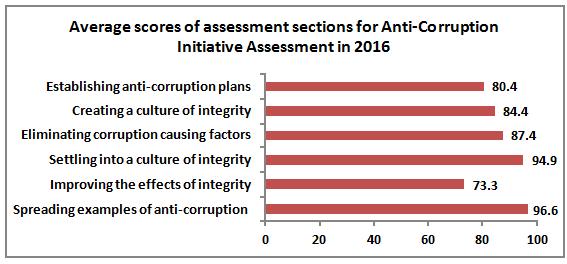ACRC Announced the Results of 2016 Anti-Corruption Initiative Assessment
- Date2017-01-19
- Hit1,602
The Small and Medium Business Administration (SMBA), Jeju Special Self-Governing Province, the Gyeonggi Urban Innovation Corporation (GICO), and the Korea Institute of S&T Evaluation and Planning (KISTEP) all showed significant improvements in their anti-corruption activities.
These improvements, among others, were revealed as the Anti-Corruption and Civil Rights Commission (ACRC) announced the results of its 2016 Anti-Corruption Initiative Assessment (AIA)* on January 19.
* The AIA is a tool that public organizations can use to self-evaluate the appropriateness and effectiveness of their anti-corruption initiatives. It is intended to encourage public organizations to make autonomous efforts towards anti-corruption.
Every year since 2002, the ACRC has carried out the AIA in order to assist organizations with improving their integrity and evaluating the effects of their anti-corruption activities.
This year’s AIA covered 266 organizations, including central administrative agencies, local governments, city and provincial education offices, national and public universities, public medical institutions, and public organizations. It evaluated anti-corruption initiatives undertaken between November 2015 and October 2016.
The results indicated that the grades of SMBA, Jeju, GICO, and KISTEP had jumped from 5 to 1 this year. This outcome can be attributed to the active participation of both high-ranking and working-level employees, the detection and control of improper solicitation types by task and rank, and institutional improvements to corruption-prone areas.
The average score of six areas aligning with the policy drafting and implementation procedure—including planning, execution, outcome, and expansion—stood at 86, a 0.9 point increase from last year’s 85.1.
The results indicate that public organizations, with an average score of 87.2, were more faithful in promoting integrity initiatives than were central administrative agencies, which scored an average 84.4. A total of 126 grade 1 and 2 scores—or 47% of all scores (compared to 49% in 2015)—were awarded to those organizations which successfully implemented anti-corruption measures in 2016, while 51 grade 4 and 5 scores—or 19% of all scores (compared to 22% in 2015)—were handed down to those organizations still requiring more anti-corruption activities.

<Best practices by assessment section>
Establishing anti-corruption plans
‧ Analyze the results of the integrity assessment, the AIA, and the opinions of stakeholders; develop promotional plans with the Anti-Corruption Integrity Promotion Team, supervised by the superintendent and the Gyeongbuk Parent Monitoring Team (Education Office of Gyeongsangbuk Province)
‧ Analyze the political environment home and abroad, including the integrity assessment results and grounds for expanding FTA partners; work with the commissioner and high-ranking officials to develop plans to eliminate chronic corruption, including provisions against granting privileges to retirees due to their former posts and the negligent inspection of reported goods (Korea Customs Service)
Eliminating corruption causing factors
‧ Operate a Tax Revenue Data Audit System, by which development data from the Ministry of Land, Infrastructure and Transport, Gyeonggi Province, and other cities and provinces—as well as other local tax data—is utilized to prevent the evasion of local taxes, administrative fines, and penalty surcharges, and to realize a fair tax system (Gyeonggi Province)
‧ Place weighted value on integrity activities in the service evaluations of partners (infrastructure, railroad maintenance, and security) in order to spread a culture of integrity to partners and improve awareness of integrity (Incheon International Airport Corporation)
‧ Project evaluators participate in the planning process of and review the so-called “self-planning project” which causes financial leakage and damages business fairness; prevent excessive budgeting for working expenses and insufficient planning (Korea Institute of Energy Technology Evaluation and Planning)
Improving the effects of integrity
‧ Utilize both ACRC and autonomously collected integrity assessment results to evaluate initiatives; collect opinions from divisions and employees in charge of integrity, as well as petitioners, to pinpoint strengths and weaknesses in their initiatives (Korea Midland Power Co., Ltd.)
This year, in adherence with Article 27.3 of the Act on Anti-Corruption and the Establishment and Operation of the Anti-Corruption and Civil Rights Commission and its enforcement decree Article 29.2, organizations subject to the AIA must post assessment results on their official websites within two weeks from when these results are announced and share the results for a minimum of one month. The ACRC will review the shared assessment results.
As they did last year, organizations and employees showing outstanding achievements will receive incentives, such as recommendations for rewards and admittance to overseas anti-corruption education and training programs.
The ACRC has stated its intention to continuously collect opinions from relevant organizations and experts so that the AIA can make practical contributions to improving integrity. The ACRC also plans to add subject organizations and improve its assessment index.









